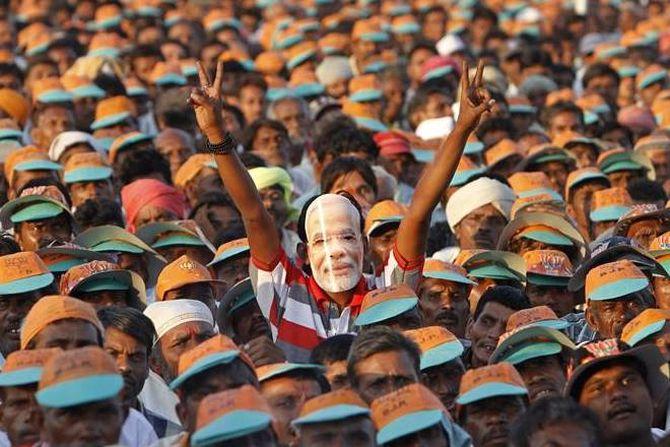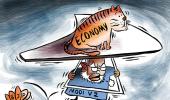'How does one square up the fact that despite the infusion of money at election time there was 'no price rise?'
'It is time the new government ordered an external audit of the RBI to find out the truth,' says Colonel Anil A Athale.

The best thing about the long drawn out elections is, thank God they are finally over.
The six-week-long political slugfest was made particularly distasteful due to the negativity that dominated it.
Like the brutal summer that is coming to an end, all Indians will heave a collective sigh of relief over this.
But the elections were not without some 'real' surprises. The biggest of them all was the lack of the perennial issue of price rise in these elections!
Economics is not my area of expertise but I do have on the authority of some of the best in business, like the late Professor J K Galbraith, that economics is nothing more than common sense mystified.
In a meeting with me in 2003, the late professor was candid enough to admit that he was not an economist at all, but an agronomist! Yet Professor Galbraith's economic ideas have had a wide acceptance and currency in the last century.
Closer home, an economics gold medalist from our family described it as 'mumbo-jumbo'.
It is on the strength of these observations that I am attempting to put forward a theory that the biggest riddle in this election was not political, but economic.
For the first time in living memory, there was remarkable price stability at election time. All economists know well that summer months are generally prone to rise in prices as perishable goods are in short supply at this time of the year.
Added to this seasonal factor was the pumping in of close to Rs 10,000 crores by the political parties as election expenses.
Conventional economic wisdom fails to give an answer to this vexed question, so I wish to stick my neck out and put forward a theory that the remarkable price stability of last two years owes itself to the gross error by the much vaunted Reserve Bank of India.
When the government carried out demonetisation on November 8, 2016, it was expected that a large chunk of 'black money' will not return to the economy. Contrary to this expectation, the RBI has come out with its annual report giving a balance-sheet of the demonetisation exercise.
Of the Rs 15.41 lakh crore demonetised currency notes of Rs 500 and Rs 1,000 denomination, only Rs 10,720 crore did not reach the banks or the RBI. This means that only 0.7 per cent of demonetised currency notes were junked in the exercise.
The government had initially expected that approximately Rs 3 lakh crore of demonetised currency notes would not come back to the banking system, thus shedding the substantial weight of black money.
How does one square up the fact that despite the infusion of money at election time there was no price rise?
The answer lies somewhere in one of the admissions made by a Reserve Bank official (never by the top brass) that the RBI actually had no accurate idea of the amount of money in circulation in the economy prior to demonetisation.
There is on ground evidence of that. Ordinary citizens know very well that prior to November 2016, their daily grocer, milkman, doctor, retail shop keepers, all dealt with cash only. The bigger fish like builders or the czars of education business and even big hospitals, all accepted under the table cash.
While it is true that resourceful and ultra-rich individuals employed 'cash mules' to convert some part of their black money into white, it is virtually certain that many millions of small time holders of black money did not have the wherewithal or the resources to convert their black money into white.
The RBI's estimate of 99.07% money having come back to the economy is the biggest lie of the 21st century. The RBI has resorted to this lie to cover up for its inefficiency/failure to even know the approximate amount of cash circulating in the Indian economy.
Partly the RBI sinned as it was headed by a rock star economist who had no understanding of the Indian ground reality.
The absence of price rise in the last two years thus is due to the fact that a huge amount of cash was sucked out of the economy due to demonetisation. While price stability is a good thing, the lack of cash in the economy is hurting large sections of society.
It is time the new government ordered an external audit of the RBI to find out the truth. The issue is important as it is holding back the Indian economy.
It is time to grasp the nettle, pump-prime the economy and get it out of stagnation.
Colonel Anil A Athale (retd) is coordinator of INPAD, a Pune-based think-tank.










